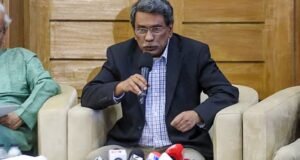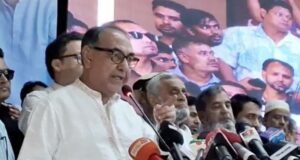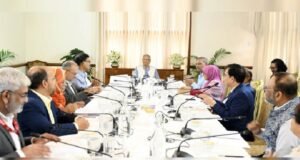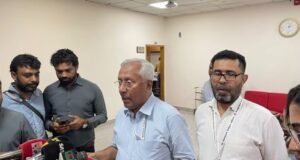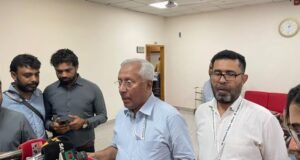
Bangla Mirror Desk:
A European delegation led by former Member of the Dutch Parliament and human rights activist Harry Van Bommel and comprised of genocide scholar from Amsterdam Dr Anthonie Holslag, UK security specialist Chris Blackburn, European Bangladesh Forum (EBF) Dutch President Bikash Chowdhury Barua and UK President Ansar Ahmad Ullah visited Chittagong 24 of May. The team accompanied by Aamra Ekattor’s Pradip Kumar Dutta, Forum for Secular Bangladesh’s Showkat Bangali visited the slaughterhouses of Jagat Malla Para and Unosottor Para of Raozan on the afternoon of May 25 and spoke to the relatives of the martyrs. The family members of the martyrs spoke about their loss and grief. Martyrs’ family members thanked the delegation for working on their behalf to recognise Bangladesh’s genocide. The leaders of the delegation expressed their gratitude in speaking to the relatives of the martyrs of Raozan and hoped for international recognition.
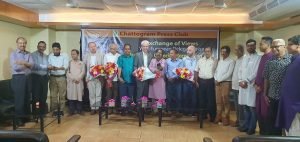
European Bangladesh Forum team were welcomed by Aamra Ekattor, Projonmo 71, and various socio-cultural organisations including Forum for Secular Bangladesh, freedom fighter AK Fazlul Haque Public Library, Amara Korbo Joi and Raozan Municipality Mayor Jamir Uddin Parvez.
Local municipal commissioner Shaukat Hasan, Professor Nirad Kul, Dr Mukul Kanti Roy, Pradeep Dey, Diplu Dey, freedom fighter Ajit Babu, freedom fighter Badal Palit, Biplab Mahajan, Dilip Sen, Mohammad Asif, Sujan Chowdhury, Mizanur Rahman, Ashraful Islam Abir and the local Pahartali UP chairman welcomed the delegation at Unosottor Para that evening. In addition, Ajit Mahajan, Swapan Das, Swapan Ghosh, Tilak Ghosh, Umapati Pal, Sanjay Pal, and Mithan Pal were present among the relatives of the martyrs.
Former Dutch MP Harry Van Bommel said that the EBF team is working at the international level to get the UN recognition of the brutal and barbaric genocide that the Pakistanis carried out on the innocent Bengalis starting on March 25. International advocacy for recognition of the 1971 genocide has already begun. This proposal has been raised not only in the Netherlands but also in the United States and the United Kingdom. Even after 50 years, the fact that the ‘Bangladesh Genocide of 1971’ is not recognised internationally is very painful. He emphasized the formation of world public opinion so that no more genocide can take place anywhere in the world.

During the Liberation War, Western countries, including the United States, opposed Bangladesh, and hence the recognition of the genocide in 1971 is delayed. Dr Anthonie Holslag said, however, now various US-based human rights organisations are recognizing the genocide in Bangladesh. It will be possible to get this recognition from the United Nations. Governments around the world must be pressured to recognise this genocide. And that is exactly why a scientific discussion is needed on this issue. Acknowledgement of genocide is important for victims and their families. He said we spoke to families, witnesses and experts of the 1971 genocide. Besides, I will go to the Netherlands with the information obtained after visiting the places of various massacres and apply for the recognition of this massacre, I will also campaign. Besides, I will take the witnesses of the genocide to the Dutch Parliament and present their statements.
British security expert Chris Blackburn said, “Our goal is to know what happened in this country in 1971 and show it to the world.” At the same time, to inform the international community about why international recognition of this genocide is necessary.
Engineer Pradip Kumar Dutta, the son of a martyr, said that the Pakistani army attacked the unarmed people of this country on the night of March 25, to strangle the Bengali liberation movement. In the operation called ‘Operation Searchlight’, the massacre was carried out in Dhaka in the early hours of the night. Bangabandhu Sheikh Mujibur Rahman declared independence before being arrested by Pakistani forces in the early hours of March 26 and the Bengali resistance began. The final victory was achieved on 16 December in return for the sacrifice of three million martyrs, the loss of honour of two and a half million mothers and sisters and the extraordinary sacrifice of the nation in the nine months of the war. An independent sovereign state called Bangladesh emerged on the world map. In 2017, a proposal to observe March 25 as ‘Genocide Day’ was accepted by Bangladesh’s Parliament to commemorate the victims of the brutal massacre by the Pakistani invading forces. Since then, Bangladesh has been demanding international recognition in this regard.
Author-journalist Showkat Bangali, Central Member Secretary of the Forum for Secular Bangladesh, said that the Forum is working to create worldwide awareness. The EBF team who visited the Pahartali slaughterhouse on the evening of 24 May was greeted by Pahartali killing fields Parishad Convenor Mostafa Kamal Jartra, former Councillor Abida Azad, Member Secretary Shahabuddin Angur, journalist Bashir Ahmed Rubel, martyred gamily member Gazi Kamal Uddin Kamrul, freedom fighter Rouful Hussain Suja, Jasim Uddin Ahmed, Selim Badshah, Abu Sufian, Motahar Hussain Swapan, Robiul Islam, Abdul Karim, Md Rony, Md Sohel, Md Sabbir, Md Abir amongst others. The EBF team also attended an international symposium at the Seniors Club on 25 May and Press Club on 26 May.
 Weekly Bangla Mirror | Bangla Mirror, Bangladeshi news in UK, bangla mirror news
Weekly Bangla Mirror | Bangla Mirror, Bangladeshi news in UK, bangla mirror news


